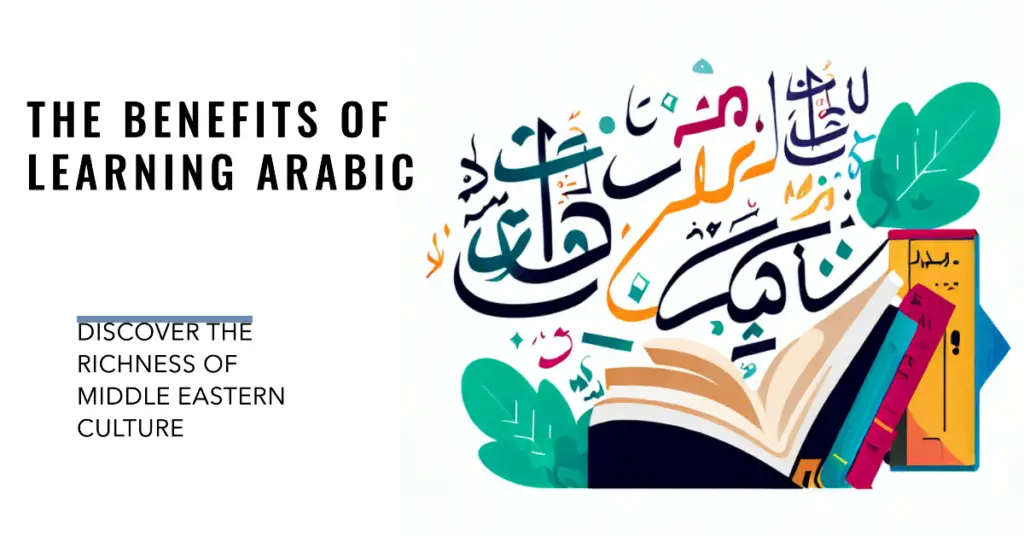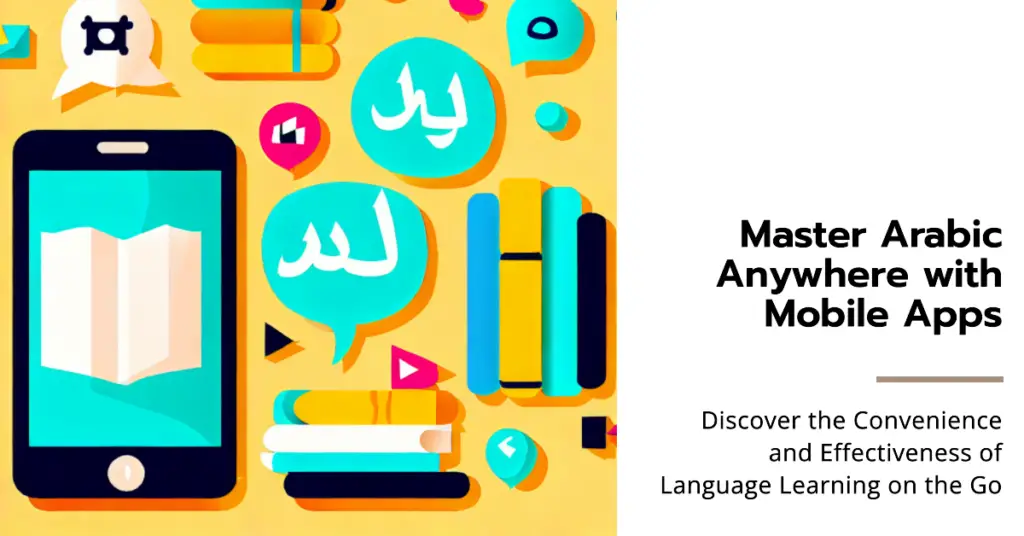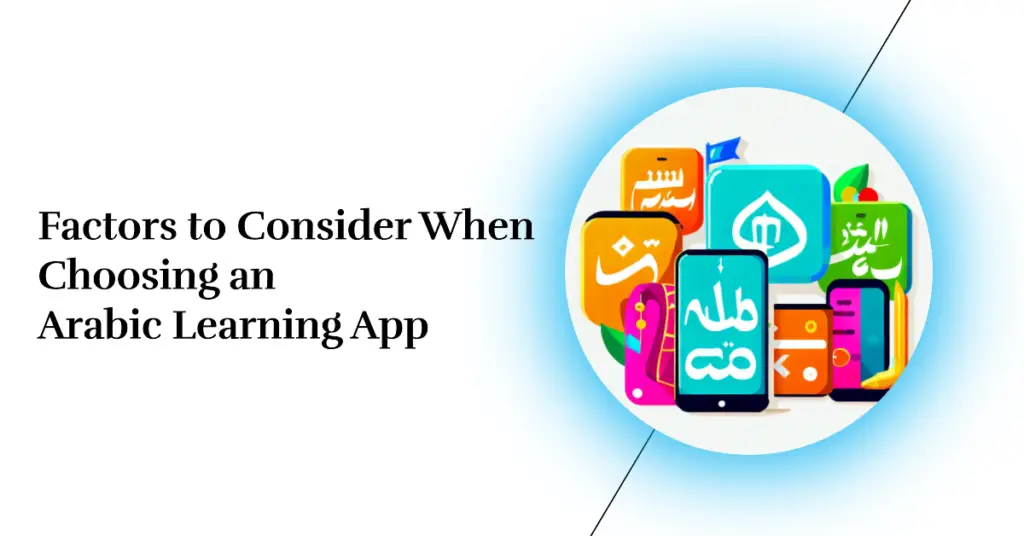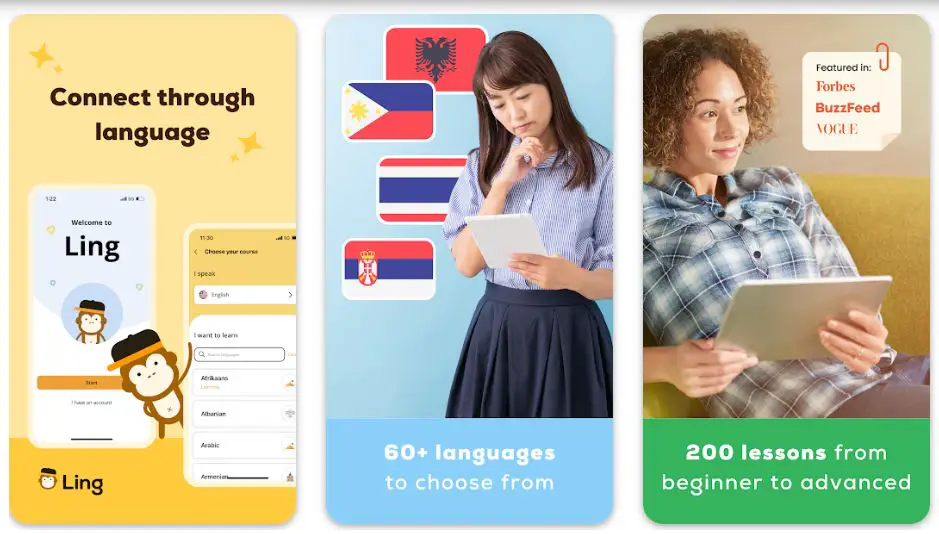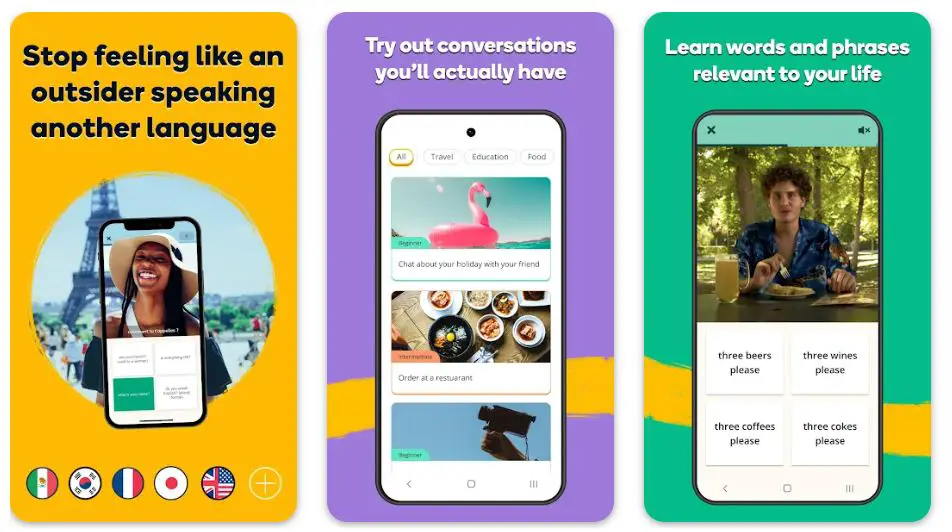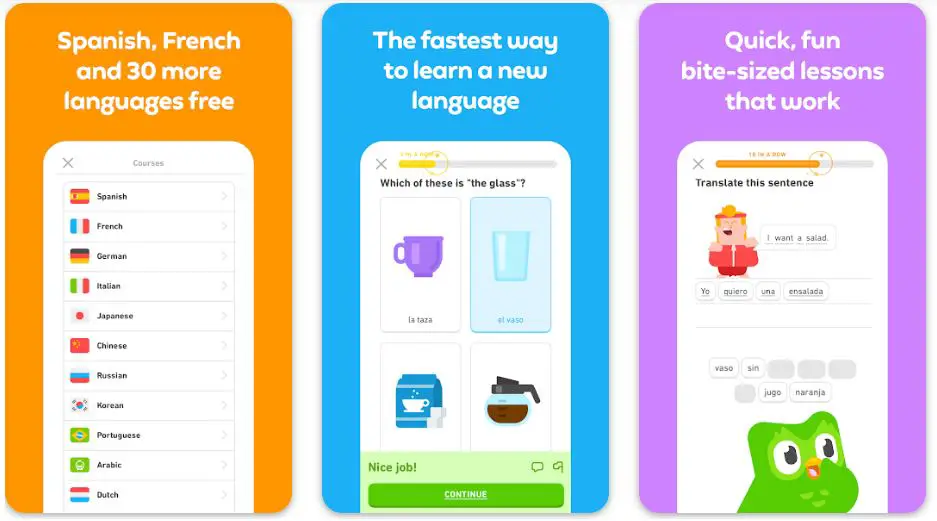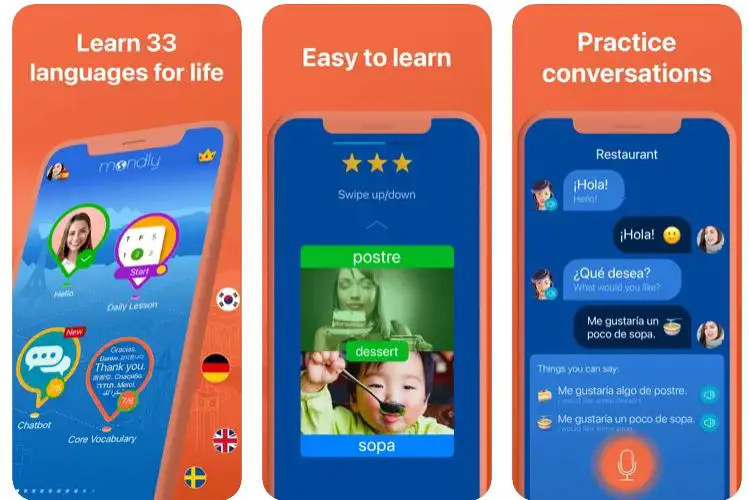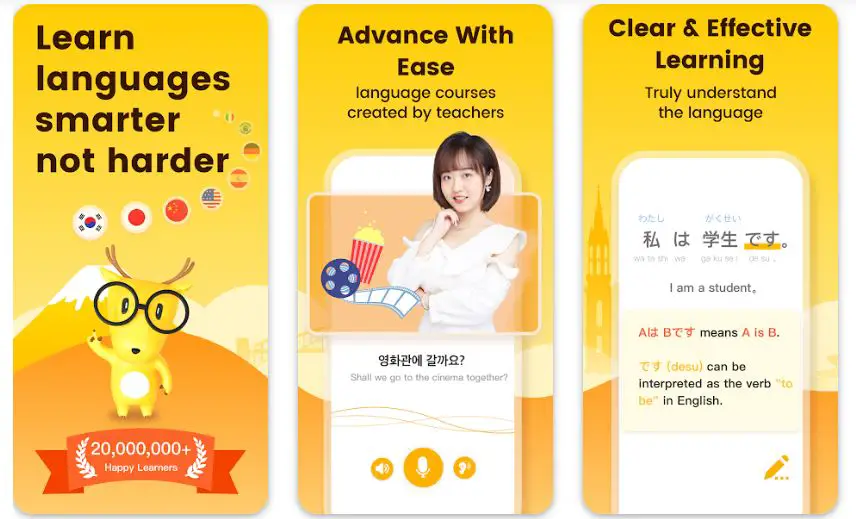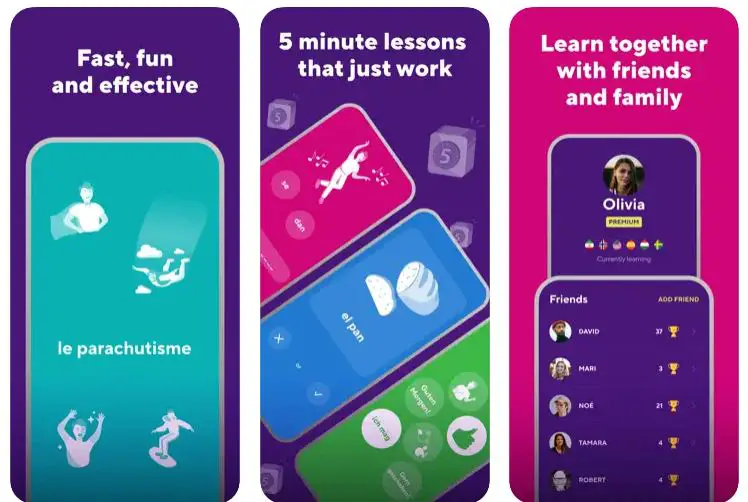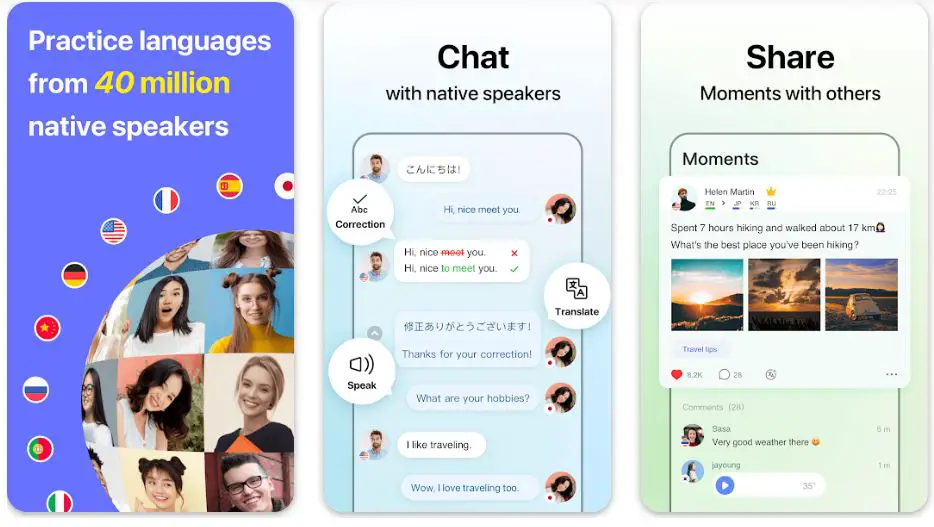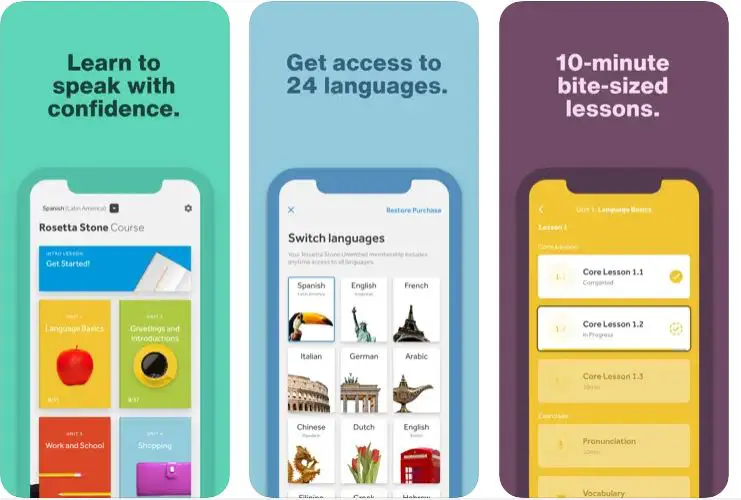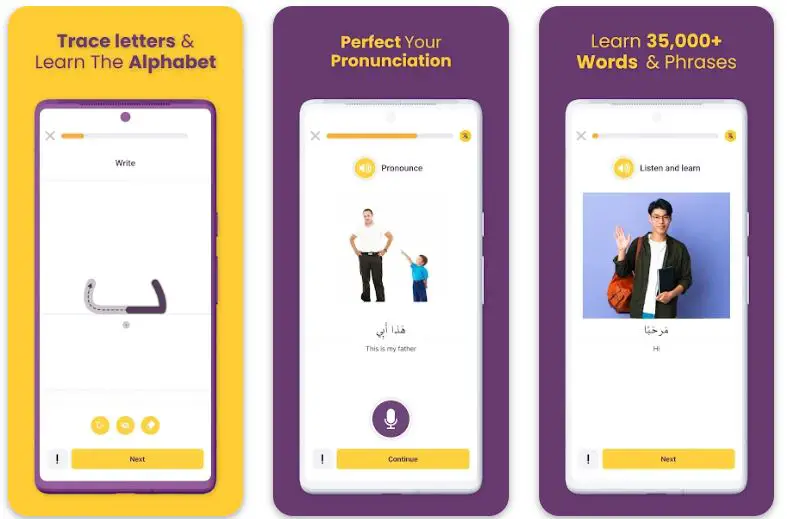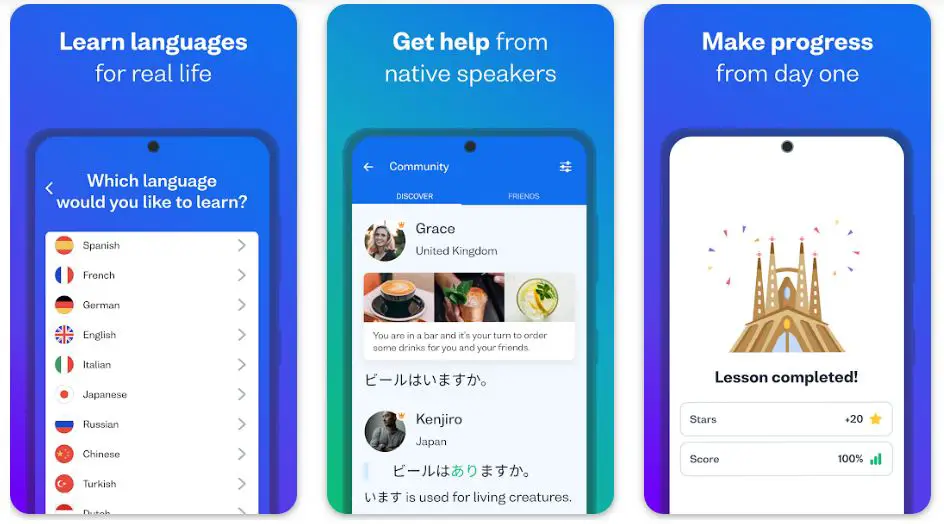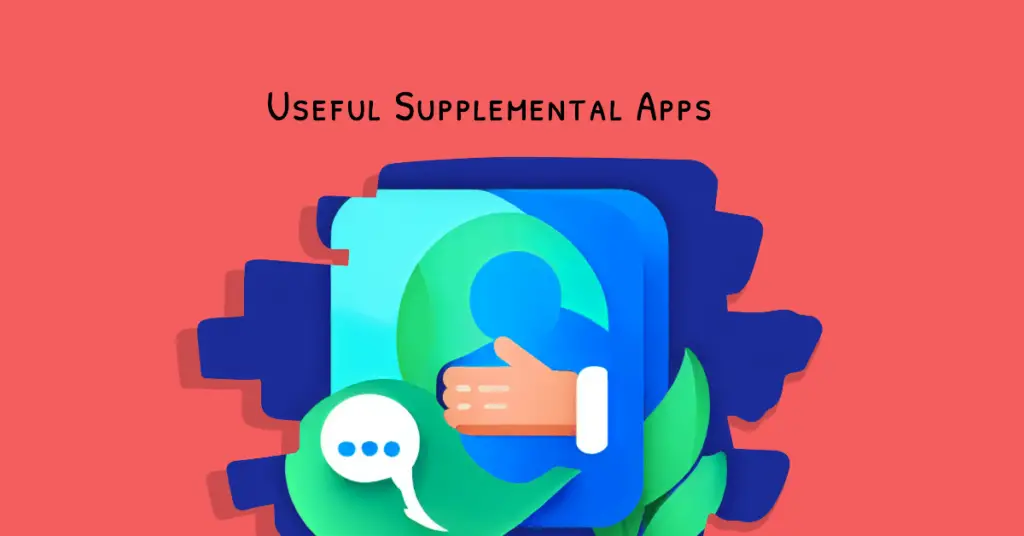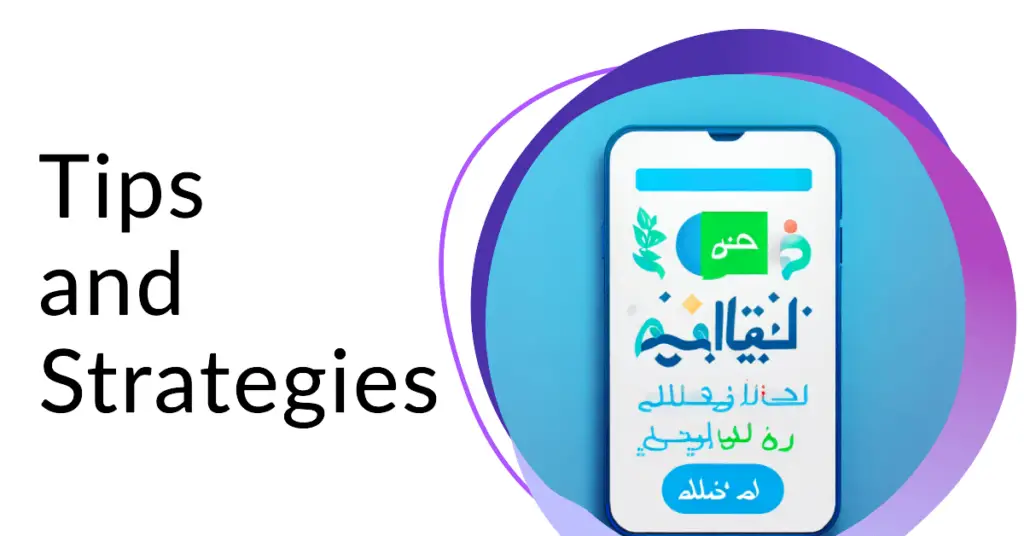If you’ve ever attempted to learn Arabic, you already understand how challenging it can be. With its intricate grammatical rules, unique script, and sounds that may not exist in your native language, it’s easy to feel overwhelmed.
Traditional language learning methods can make the process feel even more daunting. Hours spent memorizing vocabulary, wrestling with textbooks, and figuring out pronunciations can feel more like a chore than a fulfilling journey. Despite your best efforts, you might even feel like you’re progressing slowly.
But what if there was an easier, more interactive, and more enjoyable way to learn Arabic? In this digital age, numerous applications have emerged to revolutionize language learning.
The best apps to learn Arabic turn this seemingly daunting task into an engaging and rewarding experience. They integrate lessons into fun activities, offer personalized courses, and provide immediate feedback – all at the convenience of your fingertips.
In this article, we’ll explore the top apps you can use to master Arabic at your own pace and convenience, transforming the challenge into a rewarding journey of discovery.
The Benefits of Learning Arabic
Arabic, a rich and ancient language, holds immense value in today’s global landscape. Discovering the wonders of learning Arabic presents numerous advantages that span cultural, educational, and professional spheres.
Cultural Enrichment: Engaging with Arabic fosters a deep appreciation for diverse cultures and traditions. Exploring the beauty of Arabic calligraphy, poetry, and literature unveils a world of artistic expression. Understanding Arabic language intricacies enhances comprehension of Islamic heritage and enables meaningful connections with Arab-speaking communities.
Intellectual Stimulation: Learning Arabic stimulates cognitive abilities, promoting enhanced memory, critical thinking, and problem-solving skills. The complexity of Arabic grammar and its unique linguistic features provides a mental workout, expanding one’s linguistic repertoire and improving overall language proficiency.
Professional Opportunities: Proficiency in Arabic opens doors to many professional opportunities. The Arab world boasts a thriving economy, offering prospects for business ventures, trade, and employment across various industries. Skilled Arabic speakers are in high demand, especially in diplomacy, international relations, journalism, and translation services.
Academic Advancement: The pursuit of Arabic fluency enriches academic pursuits. Access to a wealth of Arabic literature and research materials empowers scholars to delve into Middle Eastern studies, archaeology, history, and political science. Arabic language skills can also lead to scholarships, exchange programs, and grants for further studies.
Cultivating Empathy: Learning Arabic fosters cross-cultural understanding, bridging gaps between diverse communities. Understanding Arabic gives insight into Arab perspectives, facilitating effective communication and nurturing empathy in a globalized world.
Embarking on the journey to learn Arabic provides many benefits, from cultural appreciation to intellectual growth and professional success. Embrace the beauty and power of Arabic, and unlock a world of endless possibilities.
Why Use Apps to Learn Arabic?
In the era of technology and convenience, leveraging mobile applications for learning Arabic is an intelligent choice. Apps to learn Arabic provide a plethora of benefits, transforming language acquisition into an engaging and effective experience.
Flexibility and Convenience: One of the key advantages of utilizing language learning apps is their flexibility. With apps to learn Arabic, learners can access lessons and practice materials anytime, anywhere, fitting seamlessly into their busy schedules. Whether commuting, waiting in line, or enjoying a quiet moment at home, language learning is just a tap away.
Interactive and Engaging: Language learning apps employ innovative and interactive techniques to make the process enjoyable. These apps keep learners motivated and engaged, from gamified quizzes to immersive exercises. Features like voice recognition technology enable pronunciation practice, ensuring accurate language production.
Personalized Learning: Apps offer personalized learning experiences tailored to individual needs and proficiency levels. Through adaptive algorithms, they track progress and provide targeted feedback, highlighting areas for improvement. This personalized approach enhances the effectiveness of language learning, maximizing the learner’s potential.
Multimedia Rich: Learning Arabic through apps exposes learners to various multimedia resources. Interactive audio and video content, authentic dialogues, and cultural insights deepen understanding and immerse learners in the language. Such immersive experiences enhance comprehension and fluency development.
Community and Support: Language learning apps often provide access to a vibrant community of fellow learners and native speakers. Collaborative features, such as discussion boards and language exchange platforms, foster meaningful interactions, enabling learners to practice Arabic in a supportive environment.
Embracing language learning apps for Arabic offers a modern and efficient path to mastering the language. With their flexibility, interactivity, personalization, multimedia richness, and supportive communities, these apps empower learners to embark on an exciting linguistic journey. Start your Arabic learning adventure today and witness the transformative power of technology.
Factors to Consider When Choosing an Arabic Learning App
Selecting the right learning app is crucial when embarking on your journey to learn Arabic. With many options available, it’s important to consider several factors that will ensure an effective and enjoyable learning experience.
Here are key considerations to keep in mind when choosing an Arabic learning app.
1. Curriculum and Content: Look for an app that offers a comprehensive curriculum aligned with your learning goals. It should cover all aspects of Arabic language learning, including vocabulary, grammar, pronunciation, and cultural insights. Diverse content, such as dialogues, audio recordings, and interactive exercises, enriches learning.
2. User Experience and Interface: A user-friendly app with an intuitive interface enhances engagement and navigation. Seek an app with clear instructions, easy access to lessons, and well-structured content. Smooth functionality and visually appealing design contribute to an enjoyable learning environment.
3. Gamification and Interactivity: Gamified elements, such as rewards, challenges, and progress tracking, add fun and motivation. Interactive features like voice recognition, quizzes, and speaking exercises allow active participation and hands-on learning.
4. Personalization and Progress Tracking: An app that offers personalized learning paths and adapts to your proficiency level ensures efficient learning. Progress tracking features provide insights into your strengths and areas for improvement, allowing you to tailor your study plan accordingly.
5. Community and Support: Consider apps that foster community through discussion forums, language exchange platforms, or access to native speakers. Interacting with fellow learners and receiving support from a vibrant community can enhance motivation and provide practice opportunities.
By carefully evaluating these factors, you can choose an Arabic learning app that suits your specific needs and preferences. Remember, the right app can make your language learning journey more enjoyable, efficient, and rewarding.
Top Arabic Learning Apps To Learn Arabic Effectively
1. Ling – Easy Language Lessons
In the vast landscape of language learning apps, Ling emerges as a shining star, offering an unparalleled experience for those aspiring to master the complexities of the Arabic language. With its innovative approach and advanced features, Ling has earned its rightful place as one of the best apps for learning Arabic.
With its adaptive and personalized learning techniques, Ling takes language acquisition to a new level. By tailoring lessons to individual strengths and weaknesses, the app ensures learners progress at their own pace, fostering a deep understanding of Arabic.
With an extensive library of interactive lessons, Ling immerses users in a dynamic linguistic journey, covering all facets of Arabic, from grammar and vocabulary to writing and pronunciation. The app’s diverse exercises and quizzes challenge learners to apply their knowledge actively, promoting language retention and fluency.
One of the app’s standout features is its incorporation of speech recognition technology. Ling utilizes this cutting-edge tool to provide real-time feedback on pronunciation, allowing learners to refine their Arabic accents and speak with confidence.
Furthermore, Ling fosters cultural appreciation by incorporating cultural context into its language lessons. Through authentic dialogues and culturally relevant content, users gain insight into the rich tapestry of Arab customs and traditions, making their language learning experience educational and culturally enriching.
For those seeking a flexible learning experience, Ling offers offline access to lessons. Learners can continue honing their Arabic skills without interruption, whether on a daily commute or during a flight.
Beyond its features, Ling stands out for its user-friendly interface, making navigation and progress tracking a breeze. Learners can effortlessly monitor their advancements and celebrate milestones as they master the Arabic language.
In conclusion, Ling stands tall as the best app for learning Arabic, offering adaptive learning, speech recognition, cultural insights, and offline accessibility, all wrapped up in an intuitive package. Embrace the beauty of Arabic with Ling and embark on a journey that transcends linguistic boundaries.
Pros of Ling:-
Adaptive Learning: Ling employs adaptive learning techniques, tailoring lessons to individual learners’ strengths and weaknesses. This personalized approach enhances comprehension and retention, allowing users to progress at their own pace.
Interactive Lessons: The app offers a diverse range of interactive lessons that cover various aspects of Arabic language learning, including grammar, vocabulary, writing, and pronunciation. Engaging exercises and quizzes make the learning process enjoyable and effective.
Speech Recognition Technology: Ling’s integration of speech recognition technology provides real-time feedback on pronunciation. Learners can practice speaking Arabic with confidence, ensuring accurate accent and intonation.
Cultural Context: Ling incorporates cultural context into language lessons, exposing learners to authentic dialogues and culturally relevant content. This enriches the learning experience by fostering cultural appreciation and understanding.
Offline Access: Ling allows users to download lessons for offline access. This feature is ideal for learners on the go or in areas with limited internet connectivity, ensuring continuous language learning without interruptions.
User-Friendly Interface: The app’s intuitive interface makes navigation and progress tracking straightforward. Learners can easily monitor their advancements and celebrate their achievements as they progress in learning Arabic.
Cons of Ling:-
Limited Language Selection: While Ling excels in teaching Arabic, its language selection may be limited compared to other language learning apps offering a broader range of languages.
Cost: While the app may offer some free content, access to the full range of features and lessons may require a subscription or in-app purchases, which could be a drawback for budget-conscious learners.
Dependency on Technology: Ling heavily relies on technology, including speech recognition and interactive exercises. Some learners may prefer more traditional or offline methods of language learning.
Limited Social Interaction: While Ling provides a comprehensive learning experience, it may lack the depth of social interaction in language learning platforms that emphasize community-based learning and language exchange.
Varied Learning Styles: Ling’s adaptive learning approach may not suit every learner’s preferences or learning style. Some individuals may benefit more from a structured curriculum or different teaching methodologies.
In conclusion, Ling offers many benefits, including adaptive learning, interactive lessons, speech recognition technology, cultural insights, and offline accessibility. While it may have some limitations, its strengths make it a top choice for those looking to learn Arabic efficiently and effectively through a modern and user-friendly platform.
Download The App From Google Play Store
Download The App From Apple App Store
2. Memrise – Best app For Beginners
Memrise is one of the best apps to learn Arabic, offering a comprehensive and engaging language learning experience. With its user-friendly interface and innovative features, Memrise caters to beginners and advanced learners, making it an ideal choice for language enthusiasts of all levels.
One of the key strengths of Memrise is its extensive vocabulary database. The app boasts a vast collection of words and phrases, carefully curated to ensure a well-rounded Arabic language education. Whether you aim to improve your conversational skills or dive into the nuances of Arabic grammar, Memrise has you covered.
Moreover, Memrise employs a spaced repetition system (SRS), a proven technique that optimizes long-term memory retention. By intelligently spacing out the repetition of vocabulary and grammar concepts, the app helps learners reinforce their knowledge effectively. This feature ensures you learn and retain Arabic words and phrases over time.
The app’s interactive lessons are another highlight. Memrise incorporates multimedia elements such as audio recordings and visual aids to create an immersive learning experience. The app enhances comprehension and pronunciation skills by engaging multiple senses, enabling learners to grasp Arabic more easily.
Additionally, Memrise fosters a sense of community and interactivity. Through forums, users can connect with fellow learners to discuss language-related topics, seek advice, and practice their Arabic skills through language exchange. This aspect promotes a supportive learning environment and encourages learners to stay motivated on their language-learning journey.
In conclusion, Memrise is a leading app to learn Arabic, thanks to its extensive vocabulary database, efficient spaced repetition system, interactive lessons, and vibrant user community. Embark on your Arabic language learning adventure with Memrise and unlock a world of linguistic possibilities.
Pros:-
Extensive vocabulary database: Memrise offers many words and phrases, ensuring a comprehensive Arabic language education.
Spaced repetition system (SRS): The app uses a scientifically-backed technique to optimize long-term memory retention, helping learners reinforce their knowledge effectively.
Interactive lessons: Memrise incorporates multimedia elements such as audio recordings and visual aids, creating an immersive and engaging learning experience.
Community and interactivity: Users can connect with fellow learners through forums, fostering a supportive environment for discussion, advice, and language exchange.
User-friendly interface: Memrise’s interface is intuitive and easy to navigate, making it accessible for learners of all levels.
Gamification elements: The app employs gamification techniques like points and streaks to motivate learners and make the language learning process enjoyable.
Cons:-
Limited depth in advanced topics: While Memrise provides a solid foundation in Arabic, it may not delve into advanced or specialized topics in great detail.
Free version limitations: Some features and content may be restricted to paid subscribers, limiting access for users who opt for the free version.
Dependence on user-generated content: Memrise relies on user-generated courses, which may vary in quality and accuracy, leading to inconsistencies in learning materials.
Lack of formal instruction: Memrise primarily focuses on vocabulary and phrase learning, so learners seeking comprehensive grammar instruction may need to supplement their studies with additional resources.
Limited offline functionality: The app’s offline mode has certain limitations, requiring an internet connection to access lessons and features fully.
Despite a few limitations, Memrise remains a top contender for learning Arabic due to its extensive vocabulary database, effective learning techniques, interactive lessons, and vibrant user community.
Price:-
- Free (In-app purchases)
- Monthly Language Learning Plan$8.99
- Memrise Subscription Offer$44.99
- Memrise Subscription Offer$89.99
- 3-Month Language Learning Plan$24.99
- Annual Language Learning Plan$89.99
- Lifetime Plan$119.99
- Memrise Subscription Offer$89.99
- Memrise Subscription Offer$79.99
- Memrise Subscription Offer$44.99
- Weekly Language Learning Plan$2.99
Download The App From Google Play Store
Download The App From Apple App Store
3. Duolingo
Duolingo is an exceptional language-learning app that stands out as one of the most effective apps to learn Arabic. With its innovative approach and engaging features, Duolingo offers a comprehensive language learning experience that caters to learners of all levels.
One of the key strengths of Duolingo is its gamified learning system. The app transforms language learning into a fun and addictive adventure where learners earn points, unlock levels, and compete with friends. This gamification motivates learners and enhances their engagement and retention of Arabic language skills.
The app’s bite-sized lessons are another highlight. Duolingo breaks down language learning into manageable chunks, allowing learners to progress at their own pace. The lessons cover various aspects of Arabic, including vocabulary, grammar, and sentence structure, ensuring a well-rounded language education.
Additionally, Duolingo incorporates adaptive learning technology that personalizes the learning experience for each user. The app adapts to the learner’s strengths and weaknesses, providing targeted exercises and review sessions to address areas that require further improvement. This personalized approach optimizes the learning process and helps learners advance more efficiently.
Another noteworthy feature of Duolingo is its audio pronunciation practice. The app provides audio recordings of native Arabic speakers, allowing learners to listen and imitate correct pronunciation. This feature helps develop accurate pronunciation skills and boosts overall language fluency.
Furthermore, Duolingo fosters community by enabling learners to connect with fellow language enthusiasts. Users can join discussion boards, participate in challenges, and practice their Arabic skills through language exchange. This community aspect adds an interactive and supportive element to the learning experience.
In conclusion, Duolingo is an outstanding choice for anyone looking to learn Arabic. With its gamified approach, bite-sized lessons, adaptive learning technology, audio pronunciation practice, and vibrant community, Duolingo empowers learners to embark on a successful Arabic language learning journey.
Start your Arabic learning adventure with Duolingo and unlock a world of linguistic possibilities.
Pros:-
Gamified learning: Duolingo’s gamified approach makes language learning fun and engaging, motivating learners to stay consistent and progress.
Bite-sized lessons: The app’s lessons are structured in manageable chunks, allowing learners to study independently and fit learning into their schedules.
Adaptive learning: Duolingo’s adaptive technology tailors the learning experience to each individual, providing targeted exercises and reviews based on learners’ strengths and weaknesses.
Audio pronunciation practice: The app offers audio recordings by native speakers, enabling learners to improve their pronunciation skills and develop a more authentic accent.
Community engagement: Duolingo provides a platform for learners to connect with others, join discussion boards, and participate in challenges, fostering community and support.
Cons:-
Limited focus on grammar: While Duolingo covers various language aspects, including vocabulary and sentence structure, its emphasis on grammar may be relatively limited compared to other resources.
Lack of in-depth explanations: The app often relies on context and repetition rather than thorough explanations, which may leave some learners wanting more detailed information.
Dependency on mobile devices: Duolingo is primarily designed as a mobile app, which may be limiting for users who prefer or require a desktop or offline learning experience.
User-generated content quality: As Duolingo relies on user-contributed content, the quality and consistency of lessons may vary depending on the course creators.
Limited speaking and writing practice: Duolingo offers some speaking and writing exercises but may not fully simulate real-life conversations or provide extensive writing practice.
Despite these limitations, Duolingo remains an excellent choice for learning Arabic, thanks to its gamified approach, bite-sized lessons, adaptive learning technology, audio pronunciation practice, and community engagement. It provides a solid foundation for language learning and a valuable resource in a comprehensive Arabic language learning journey.
Price:-
- Free (In-app purchases)
- Super Duolingo$9.99
- Super Duolingo$83.99
- Super Duolingo$12.99
- Barrel of Gems (1200)$4.99
- Cart of Gems (3000)$9.99
- Cart of Gems (6500)$19.99
Download The App From Google Play Store
Download The App From Apple App Store
4. Mondly
When learning Arabic, Mondly stands out as an exceptional language-learning app. With its comprehensive features and innovative approach, Mondly offers an immersive and effective learning experience for Arabic learners of all levels.
One of the key strengths of Mondly is its cutting-edge speech recognition technology. This feature allows learners to practice their Arabic pronunciation and receive instant feedback, ensuring accurate and confident speaking skills. With Mondly, learners can develop their linguistic fluency and master the nuances of Arabic phonetics.
The app’s rich and diverse content is another highlight. Mondly provides many Arabic lessons covering vocabulary, grammar, and conversational phrases. The lessons are designed to be engaging and interactive, utilizing multimedia elements such as audio recordings, visuals, and quizzes. This immersive approach enhances comprehension and retention, making learning enjoyable and effective.
Moreover, Mondly incorporates gamification to motivate learners and track their progress. Users are encouraged to stay motivated and consistently engage with the app by earning points, completing challenges, and unlocking achievements. This gamified approach adds an element of fun and competition to the language-learning journey.
Additionally, Mondly offers personalized learning paths tailored to the individual needs of learners. The app adapts to learners’ proficiency levels, interests, and learning goals, providing customized lessons and exercises. This personalized approach ensures that learners receive targeted instruction and continuously progress in their Arabic language skills.
In conclusion, Mondly is a top-tier app for learning Arabic, combining advanced speech recognition technology, rich content, gamification, and personalized learning paths. With Mondly, learners can embark on an effective and enjoyable language-learning journey.
Start your Arabic learning adventure with Mondly and experience the transformative power of this exceptional language-learning app.
Pros:-
Speech recognition technology: Mondly’s advanced speech recognition technology enables learners to practice and improve their Arabic pronunciation skills.
Rich and diverse content: The app offers a wide range of Arabic lessons, covering vocabulary, grammar, and conversational phrases, providing a comprehensive language learning experience.
Engaging and interactive: Mondly incorporates multimedia elements, such as audio recordings, visuals, and quizzes, to create an immersive and interactive learning environment.
Gamification: The app uses gamification techniques, such as points, challenges, and achievements, to motivate learners and make the learning process enjoyable.
Personalized learning paths: Mondly adapts to the individual needs of learners, providing customized lessons and exercises based on proficiency levels, interests, and learning goals.
Cons:-
Limited free content: Some advanced features and content may require a paid subscription, limiting access to free users.
Dependence on mobile devices: Mondly is primarily designed as a mobile app, which may not be suitable for learners preferring desktop or offline learning.
Less focus on cultural context: While Mondly offers language instruction, it may have limited coverage of cultural aspects of the Arabic language and customs.
User-generated content quality: Mondly relies on user-generated content, which can vary in quality and accuracy, potentially leading to inconsistencies in learning materials.
Limited depth in advanced topics: The app may not cover advanced or specialized topics in detail, requiring supplemental resources for in-depth language learning.
Despite these limitations, Mondly remains an excellent choice for learning Arabic, thanks to its speech recognition technology, rich content, interactive approach, gamification, and personalized learning paths. It provides learners the tools and resources to effectively develop their Arabic language skills.
Price:-
- Free (In-app purchases)
- Language learning$9.99
- Language learning$9.99
- Unlimited Access 12 Months All v2$47.99
- Mondly Premium 1-month$9.99
- Learn languages$9.99
- Unlimited Access 1 Month Trial$9.99
- Premium$14.99
- Premium all Languages Promo$19.99
- Unlimited Access 1 Month All WQ v2$9.99
- Unlimited Access 1 Month 50%$4.99
Download The App From Google Play Store
Download The App From Apple App Store
5. LingoDeer
When learning Arabic, LingoDeer stands out as an exceptional language-learning app. With its comprehensive features and effective teaching methods, LingoDeer is the best app to learn Arabic for individuals seeking to master the Arabic language.
One of the key strengths of LingoDeer is its structured and systematic approach to language learning. The app provides carefully crafted lessons that guide learners through the Arabic language step by step. From basic vocabulary and grammar to more complex sentence structures, LingoDeer ensures a solid foundation in Arabic proficiency.
The app’s interactive exercises are designed to enhance language acquisition and retention. LingoDeer incorporates diverse activities, such as fill-in-the-blanks, listening comprehension, and image matching, to engage learners and reinforce their understanding of Arabic concepts. This interactive approach promotes active learning and enables learners to practice their skills in a dynamic environment.
Moreover, LingoDeer offers audio recordings by native speakers to improve learners’ pronunciation and listening skills. By hearing and mimicking authentic Arabic pronunciation, learners can develop an accurate accent and enhance their fluency.
Additionally, LingoDeer provides progress tracking and personalized review features to help learners stay motivated and reinforce their learning. The app allows users to track their learning achievements, set goals, and receive personalized feedback, creating a sense of accomplishment and guiding learners toward continued improvement.
In conclusion, LingoDeer is an outstanding app for learning Arabic. Its structured approach, interactive exercises, audio recordings by native speakers, and progress-tracking features make it an excellent resource for mastering the Arabic language.
Start your Arabic learning journey with LingoDeer and unlock a world of linguistic possibilities.
Pros:-
Structured and systematic approach: LingoDeer provides well-organized lessons that guide learners through the Arabic language step-by-step.
Interactive exercises: The app incorporates various interactive activities to engage learners and reinforce their understanding of Arabic concepts.
Audio recordings by native speakers: LingoDeer offers audio recordings by native speakers, allowing learners to improve their pronunciation and listening skills.
Progress tracking and personalized review: The app provides tools for tracking learning progress, setting goals, and receiving personalized feedback, keeping learners motivated and focused on their language learning journey.
User-friendly interface: LingoDeer has an intuitive and user-friendly interface, making it easy for learners of all levels to navigate and use.
Cons:-
Limited conversational practice: While LingoDeer covers vocabulary and grammar, it may have a limited emphasis on conversational practice, which is crucial for developing fluency in Arabic.
Focus on recognition over production: The app may focus more on recognizing words and phrases rather than actively producing them in speaking and writing exercises.
Limited cultural context: LingoDeer’s primary focus is language instruction, so it may have limited coverage of cultural aspects of the Arabic language and customs.
Lack of extensive supplementary materials: Some learners may desire additional resources or materials for more in-depth study beyond what LingoDeer offers.
LingoDeer remains a highly effective app for learning Arabic, thanks to its structured approach, interactive exercises, audio recordings by native speakers, progress tracking, and user-friendly interface. While it may have some limitations in certain areas, it provides learners with a solid foundation in Arabic and is a valuable tool for language acquisition.
Price:-
- Free (In-app purchases)
- Multilingual Pass – Monthly$14.99
- Multilingual Pass (Annual)$79.99
- Multilingual Pass – Lifetime$159.99
- Multilingual Pass (Annual)$79.99
- Multilingual Pass – Quarterly$34.99
- Korean Monthly subscription$12.99
- Japanese Monthly Subscription$12.99
- Korean Quarterly subscription$32.99
- Spanish Monthly Subscription$12.99
- Korean Pass – Yearly$76.99
Download The App From Google Play Store
Download The App From Apple App Store
6. Drops
Drops is an extraordinary language-learning app that stands out as one of the best apps to learn Arabic. With its unique approach and captivating design, Drops provides an immersive and engaging language learning experience for Arabic learners of all levels.
One of the key strengths of Drops is its visual-based learning. The app presents Arabic vocabulary and phrases through visually appealing illustrations and animations, making learning enjoyable and effective. This visual approach aids in memory retention and helps learners associate words with their meanings, enhancing language acquisition.
The app’s bite-sized lessons are another highlight. Drops offer quick, five-minute sessions that fit into even the busiest schedules. Each lesson focuses on a specific topic, such as greetings, numbers, or food, ensuring a targeted and efficient learning experience.
Additionally, Drops employs spaced repetition to reinforce vocabulary and ensure long-term retention. The app strategically schedules vocabulary review sessions based on the learner’s progress, optimizing memorization and preventing information overload.
Furthermore, Drops provides audio recordings by native speakers for accurate pronunciation practice. Learners can listen to the correct pronunciation of Arabic words and phrases, imitate the sounds, and confidently develop their speaking skills.
In conclusion, Drops is a remarkable app for learning Arabic. It’s visual-based learning, bite-sized lessons, spaced repetition system, and audio recordings by native speakers make it a powerful tool for language acquisition.
Embark on your Arabic learning journey with Drops and experience the joy of mastering a new language.
Pros:-
Visual-based learning: Drops utilizes visually appealing illustrations and animations to enhance vocabulary acquisition, making the learning process engaging and memorable.
Bite-sized lessons: The app offers quick, five-minute sessions that are convenient to fit into busy schedules, allowing learners to make consistent progress.
Spaced repetition system: Drops employs repetition to reinforce vocabulary learning and optimize long-term retention.
Audio recordings by native speakers: The app provides audio recordings by native speakers, allowing learners to practice accurate pronunciation and improve their speaking skills.
Sleek and intuitive design: Drops features a visually pleasing and user-friendly interface, enhancing the learning experience.
Cons:-
Limited depth in grammar: While Drops is effective for vocabulary acquisition, it may have limited coverage of Arabic grammar and sentence structure.
Lack of conversational practice: The app may focus more on vocabulary learning than developing conversational skills crucial for real-life language usage.
Limited content in the free version: Some advanced features and lessons may require a premium subscription, limiting access to free users.
Less emphasis on writing skills: Drops primarily focuses on vocabulary and listening skills, offering limited opportunities for practicing Arabic writing.
Despite these limitations, Drops remains an outstanding app for learning Arabic, thanks to its visual-based approach, bite-sized lessons, spaced repetition system, audio recordings by native speakers, and sleek design. It provides learners with an enjoyable and effective language-learning experience.
Price:-
- Free (In-app purchases)
- Premium$9.99
- All Language Learning Plans$69.99
- Holiday premium!$39.99
- Premium$99.99
- Premium$79.99
- Genius for a month$7.99
- Premium$11.99
- Curious for a month$22.99
- Premium$14.99
- Unlimited time for all Languages!$59.99
Download The App From Google Play Store
Download The App From Apple App Store
7. HelloTalk
HelloTalk is a standout among the apps for learning Arabic, providing a robust language exchange and immersive learning platform. With its unique features and emphasis on community engagement, HelloTalk offers an unparalleled opportunity for Arabic learners worldwide.
One of the notable strengths of HelloTalk is its thriving language exchange community. The app connects learners with native Arabic speakers also learning their target language.
This creates an environment for authentic conversations and cultural exchange, allowing users to practice their Arabic skills with native speakers and receive valuable feedback on their language proficiency.
HelloTalk’s correction and translation features further enhance the learning experience. Learners can write or speak in Arabic and receive instant corrections from native speakers, helping them improve their accuracy and fluency. The app also provides translation assistance, enabling users to understand and communicate effectively in Arabic.
Moreover, HelloTalk fosters a vibrant community of language enthusiasts. Users can join language-specific discussion groups, participate in voice calls, and engage in language-related topics with fellow learners. This community aspect enhances language skills and promotes cultural understanding and global connections.
With HelloTalk’s multi-media sharing features, users can exchange language-related content such as photos, audio recordings, and doodles. This interactive feature allows for creative language practice and diverse language contexts.
In conclusion, HelloTalk is an exceptional choice among apps to learn Arabic. Its language exchange community, correction and translation features, community engagement, and multi-media sharing create an immersive and effective learning environment.
Embrace HelloTalk and unlock your full potential in mastering the Arabic language through authentic interactions and cultural exchange.
Pros:-
Language exchange community: HelloTalk connects learners with native Arabic speakers, providing authentic conversations and cultural exchange opportunities.
Correction and translation features: The app offers instant corrections from native speakers, helping learners improve their accuracy and fluency in Arabic. Translation assistance is also available for effective communication.
Community engagement: HelloTalk fosters a vibrant community of language enthusiasts, allowing users to participate in language-specific discussion groups, voice calls and engage in language-related topics.
Multi-media sharing: Users can exchange photos, audio recordings, and doodles, adding a creative and interactive element to language practice.
Immersive learning experience: HelloTalk provides an immersive environment for language learning, facilitating real-time interactions with native Arabic speakers.
Cons:-
Reliance on user-generated content: The quality and consistency of language exchanges and corrections can vary depending on the proficiency and availability of native speakers.
Limited formal instruction: HelloTalk focuses on conversation and language exchange rather than providing structured grammar and vocabulary acquisition lessons.
Potential time commitment: Engaging in language exchange and maintaining conversations with native speakers may require a significant time investment.
Limited control over learning pace: As interactions depend on the availability and responsiveness of language partners, learners may have less control over their learning pace.
Despite these limitations, HelloTalk remains an excellent choice among apps to learn Arabic, thanks to its language exchange community, correction and translation features, community engagement, multi-media sharing, and immersive learning experience. It gives learners unique opportunities to engage with native speakers and develop their language skills authentically and interactively.
Price:-
- Free (In-app purchases)
- Monthly auto-renewal VIP$12.99
- VIP Membership Yearly$79.99
- VIP Membership$79.99
- VIP Membership Monthly$12.99
- 649 HT Coins$9.99
- 324 HT Coins$4.99
- 64 HT Coins$0.99
- VIP Membership Yearly$79.99
- VIP Membership Weekly$6.99
- VIP Membership(Free Trial)$12.99
Download The App From Google Play Store
Download The App From Apple App Store
8. Rosetta Stone
Rosetta Stone is one of the best apps to learn Arabic, providing a comprehensive and immersive language learning experience. With its proven methodology and advanced features, Rosetta Stone offers a highly effective approach for Arabic language learners.
One of the key strengths of Rosetta Stone is its immersion-based learning method. The app employs a natural language acquisition approach, where learners are exposed to Arabic in context-rich environments.
Through interactive lessons, speech recognition technology, and real-life simulations, Rosetta Stone creates an immersive learning environment that naturally mirrors how we learn languages.
The app’s adaptive learning technology is another highlight. Rosetta Stone tailors the learning experience to each individual’s proficiency level and learning style. The app tracks progress, provides personalized feedback, and adjusts lesson difficulty accordingly, ensuring an optimized learning path for every learner.
Moreover, Rosetta Stone offers a comprehensive curriculum that covers various aspects of Arabic language learning, including vocabulary, grammar, pronunciation, and cultural understanding. The app’s carefully designed lessons and activities provide a well-rounded language education.
Furthermore, Rosetta Stone’s live tutoring sessions with native Arabic-speaking tutors provide additional support and guidance. Learners can engage in one-on-one conversations, receive personalized feedback, and practice their Arabic skills in real time, fostering confidence and fluency.
In conclusion, Rosetta Stone is an exceptional app for learning Arabic, offering an immersive learning method, adaptive technology, a comprehensive curriculum, and live tutoring sessions.
Embrace Rosetta Stone as your language-learning companion and unlock your full potential in mastering Arabic with confidence and proficiency.
Pros:-
Immersion-based learning: Rosetta Stone creates an immersive language learning environment, allowing learners to acquire Arabic naturally through context-rich lessons.
Adaptive learning technology: The app adjusts the learning experience based on the individual learner’s proficiency level and learning style, providing personalized feedback and optimized lesson difficulty.
Comprehensive curriculum: Rosetta Stone covers various aspects of Arabic language learning, including vocabulary, grammar, pronunciation, and cultural understanding, ensuring a well-rounded language education.
Live tutoring sessions: The app offers one-on-one conversations with native Arabic-speaking tutors, providing personalized guidance and the opportunity to practice Arabic skills in real time.
Speech recognition technology: Rosetta Stone’s speech recognition feature helps learners improve their pronunciation and speaking skills by providing instant feedback.
Cons:-
Limited free content: While the app offers a free trial, access to the full range of lessons and features may require a subscription or purchase.
Less emphasis on conversational practice: Rosetta Stone’s methodology focuses more on vocabulary and sentence structure, which may result in less emphasis on conversational fluency.
Reliance on the app interface: The app primarily relies on its platform, limiting the availability of offline or cross-platform learning options.
Less focus on cultural context: While Rosetta Stone covers language instruction, it may have limited coverage of cultural aspects of the Arabic language and customs.
May not suit all learning preferences: The immersion-based and structured nature of Rosetta Stone’s methodology may not align with all learners’ learning preferences or goals.
Despite these limitations, Rosetta Stone remains an excellent choice for learning Arabic, thanks to its immersion-based approach, adaptive learning technology, comprehensive curriculum, live tutoring sessions, and speech recognition feature. It gives learners a solid foundation in Arabic and valuable support in their language-learning journey.
Price:-
- Free (In-app purchases)
- Unlimited Languages – 1 Year$109.99
- Spanish (Lat. Am.) – 3 Months$44.99
- Spanish 12 Months Access$109.99
- Unlimited Languages – 1 Year$109.99
- Unlimited Languages – Lifetime$199.99
- Spanish (Lat. Am.) – 3 Months$54.99
- English (American) – 3 Months$44.99
- Spanish (Lat. Am.) – 12 Months$119.99
- French – 3 Months$44.99
- Spanish (Latin America) (5 Levels)$199.99
Download The App From Google Play Store
Download The App From Apple App Store
9. AlifBee – Best app to learn the Arabic alphabet
AlifBee is an exceptional app designed to help learners easily master Arabic. With its user-friendly interface and comprehensive features, AlifBee provides an immersive and effective learning experience for Arabic learners of all levels.
One of the key strengths of AlifBee is its structured curriculum. The app offers a well-organized set of lessons that cover Arabic vocabulary, grammar, pronunciation, and writing. Each lesson is designed to provide a step-by-step progression, ensuring a solid foundation in Arabic language skills.
The interactive exercises in AlifBee are engaging and effective. The app incorporates quizzes, listening exercises, and speaking practice to reinforce learning and improve Arabic proficiency. These interactive elements make the learning process enjoyable and dynamic.
Additionally, AlifBee caters to individual learning styles. The app provides multiple learning modes, including visual, auditory, and kinesthetic, allowing learners to choose the method that suits them best. This personalized approach enhances the effectiveness of the learning experience.
Furthermore, AlifBee offers a comprehensive set of resources. Learners can access audio recordings by native Arabic speakers, helping them improve their pronunciation and listening skills. The app also includes a writing practice feature, enabling learners to practice their Arabic handwriting.
AlifBee’s progress tracking feature allows learners to monitor their advancement. The app records completed lessons and tracks learning achievements, providing learners with accomplishment and motivation.
In conclusion, AlifBee is an outstanding app for learning Arabic. Its structured curriculum, interactive exercises, personalized learning modes, comprehensive resources, and progress-tracking features make it a powerful tool for language acquisition. Embrace AlifBee and embark on a successful Arabic learning journey confidently and easily.
Pros:-
Structured curriculum: AlifBee offers a well-organized set of lessons that cover Arabic vocabulary, grammar, pronunciation, and writing, providing a solid foundation in language skills.
Interactive exercises: The app incorporates engaging activities, quizzes, listening exercises, and speaking practice to reinforce learning and improve Arabic proficiency.
Caters to individual learning styles: AlifBee provides multiple learning modes, including visual, auditory, and kinesthetic, allowing learners to choose the method that suits them best.
Comprehensive resources: The app offers audio recordings by native Arabic speakers, helping learners improve their pronunciation and listening skills. It also includes a writing practice feature for Arabic handwriting practice.
Progress tracking: AlifBee’s progress tracking feature allows learners to monitor their advancement, keeping a record of completed lessons and providing a sense of accomplishment and motivation.
Cons:-
Limited cultural context: AlifBee’s primary focus is language instruction, which may have limited coverage of cultural aspects of the Arabic language and customs.
May not suit advanced learners: The app’s curriculum and activities may be more suitable for beginners or intermediate learners with limited advanced-level content.
Limited social interaction: AlifBee focuses primarily on self-paced learning, which may limit opportunities for social interaction with other learners or native speakers.
Less emphasis on conversational practice: While the app covers vocabulary, grammar, and pronunciation, it may have less emphasis on developing conversational fluency in Arabic.
Limited availability of free content: Some advanced features or additional resources may require a paid subscription, limiting access to free users.
Despite these limitations, AlifBee remains an excellent choice for learning Arabic, thanks to its structured curriculum, interactive exercises, personalized learning modes, comprehensive resources, and progress tracking. It gives learners a solid foundation in Arabic and valuable support in their language-learning journey.
Price:-
- Free (In-app purchases)
- Monthly Premium Plan$14.99
- Monthly Premium Plan$8.99
- Annual Premium Plan$89.99
- Monthly Subscription$18.49
- Monthly Premium Plan$7.99
- Monthly Premium Plan$7.49
- Quarterly Premium Plan$35.99
- Annual Premium Plan$56.99
- Quarterly Subscription$39.99
- Annual Premium Plan$124.99
Download The App From Google Play Store
Download The App From Apple App Store
10. Busuu
When it comes to learning Arabic, Busuu stands out as one of the top apps to learn Arabic. With its comprehensive features and interactive platform, Busuu offers an effective and engaging language learning experience for Arabic learners of all levels.
One of the key strengths of Busuu is its community-based learning. The app connects learners with a global community of native speakers, providing opportunities for language exchange and real-life conversations.
Users can practice their Arabic skills with native speakers, receive feedback, and gain insights into cultural nuances, enhancing their language proficiency.
The app’s structured lessons cover various aspects of learning Arabic, including vocabulary, grammar, listening, speaking, and writing. Each lesson is carefully crafted to provide a well-rounded language education, ensuring learners develop a solid foundation in Arabic.
Moreover, Busuu incorporates interactive exercises and quizzes that allow learners to practice their Arabic skills dynamically and engagingly. The app provides instant feedback and corrections, guiding learners toward accuracy and fluency.
Furthermore, Busuu’s speech recognition technology enables learners to improve their pronunciation skills by comparing their pronunciation to that of native speakers. This feature helps learners develop an authentic accent and enhances their spoken Arabic.
Busuu offers offline access to lessons, allowing learners to continue their language learning without an internet connection. This flexibility ensures that learners can study Arabic anytime and anywhere.
In conclusion, Busuu is an outstanding app for learning Arabic, offering community-based learning, structured lessons, interactive exercises, speech recognition technology, and offline access. Embrace Busuu as your language-learning companion and unlock your full potential in mastering Arabic with confidence and proficiency.
Pros:-
Community-based learning: Busuu connects learners with a global community of native speakers, providing opportunities for language exchange and real-life conversations.
Structured lessons: The app offers well-organized lessons covering various aspects of Arabic language learning, ensuring a comprehensive language education.
Interactive exercises and quizzes: Busuu incorporates engaging activities and quizzes to practice Arabic skills dynamically and interactively, providing instant feedback and corrections.
Speech recognition technology: The app’s speech recognition feature allows learners to improve their pronunciation by comparing it to that of native speakers, enhancing spoken Arabic skills.
Offline access: Busuu provides offline access to lessons, enabling learners to study Arabic anytime and anywhere, even without an internet connection.
Cons:-
Limited depth in advanced topics: While Busuu covers a wide range of language learning aspects, it may have limited depth in advanced or specialized topics in Arabic.
Less focus on cultural context: The app’s primary focus is on language instruction, which may have limited coverage of cultural aspects of the Arabic language and customs.
Free access limitations: Some advanced features or additional resources may require a premium subscription, limiting access to free users.
Less emphasis on conversational practice: While Busuu covers vocabulary, grammar, and pronunciation, it may have less emphasis on developing conversational fluency in Arabic.
Reliance on user-generated content: The quality and consistency of language exchanges and corrections can vary depending on the proficiency and availability of community members.
Despite these limitations, Busuu remains an excellent choice for learning Arabic, thanks to its community-based learning, structured lessons, interactive exercises, speech recognition technology, and offline access. It provides learners a valuable platform to improve their Arabic language skills and connect with a global community of language learners.
Price:-
- Free (In-app purchases)
- 12 Months’ Premium Plus$89.99
- Monthly Premium+ Plan$12.99
- Monthly Subscription$9.99
- 50% Off 12 Months Premium Plus$44.99
- 14-Day Trial – Premium Plus$89.99
- Annual Subscription$79.99
- Monthly Subscription$6.99
- Premium Membership$69.99
- Casual$10.99
- Annual Subscription$34.99
Download The App From Google Play Store
Download The App From Apple App Store
Useful Supplemental Apps For Learning Arabic
Arabic is a rich and fascinating language, and learning it can be rewarding but challenging. Fortunately, there are useful supplemental apps for learning Arabic that can enhance your language acquisition journey.
These apps offer a variety of features and resources to support and complement your Arabic language studies. Let’s explore some of the top choices.
Arabic Dictionary Apps: A reliable app is essential for expanding your vocabulary and understanding. Apps like “Arabic Dictionary – Dict Box” or “Arabic Dictionary & Translator” provide comprehensive word definitions, translations, and audio pronunciations, enabling you to learn new words and their usage.
Arabic Flashcard Apps: Flashcards are a tried-and-true method for memorizing vocabulary. Apps like “Anki” or “Quizlet” allow you to create custom flashcards and quizzes tailored to your specific Arabic learning needs. These apps often utilize spaced repetition techniques to optimize your memory retention.
Arabic Reading Apps: Enhancing your Arabic reading skills is crucial for comprehension and expanding your language proficiency. Apps like “Arabic Stories for Beginners” or “Al Jazeera Arabic” offer a range of Arabic reading materials, from beginner-level stories to news articles, helping you practice reading and improve your language comprehension.
Arabic Listening Apps: Listening to native speakers is vital for improving your Arabic listening skills. Apps like “Nemo Arabic” or “ArabicPod101” provide audio lessons, podcasts, and dialogues in Arabic, allowing you to practice your listening comprehension and familiarize yourself with different accents and dialects.
Arabic Grammar Apps: Understanding Arabic grammar is essential for constructing meaningful sentences. Apps like “Arabic Grammar” or “Arabic Grammar Master” offer comprehensive explanations, examples, and exercises to help you grasp the intricacies of Arabic grammar rules and structures.
Arabic Conversation Apps: Practicing Arabic conversation is crucial for developing fluency and confidence. Apps like “Tandem Language Exchange” or “HelloTalk” connect you with native Arabic speakers learning your native language. You can exchange language and improve your speaking skills through voice and text chats.
Arabic Writing Apps: Mastering Arabic writing requires practice and guidance. Apps like “Write It! Arabic” or “Arabic Handwriting” provide interactive tools to practice Arabic letter formation, stroke order, and overall handwriting skills.
Arabic Culture and Travel Apps: Understanding Arabic culture and customs can greatly enhance your language learning experience. Apps like “Arabic Culture and Travel” or “Arabic Radio and News” offer insights into Arabic traditions, cuisine, travel tips, and access to Arabic radio stations and news outlets.
Remember, while these supplemental apps can greatly support your Arabic language learning journey, they are best used alongside formal instruction or structured courses.
They provide additional practice, reinforcement, and exposure to the Arabic language, allowing you to reinforce what you’ve learned and explore different aspects of Arabic linguistics and culture.
So, whether you’re a beginner or an advanced learner, incorporating these useful supplemental apps for learning Arabic into your language learning routine can take your Arabic skills to new heights. Embrace the digital resources available, practice consistently, and immerse yourself in the beauty of the Arabic language.
Tips and Strategies for Using These Apps Effectively
To make the most of the useful supplemental apps for learning Arabic, it’s important to approach them with effective strategies and techniques.
Here are some tips to help you maximize your language learning experience:
Set specific goals: Define your language learning goals before using the apps. Whether improving vocabulary, mastering grammar, or enhancing conversational skills, having clear objectives will guide your app usage and keep you focused.
Create a study schedule: Consistency is key. Dedicate regular time slots for using the language learning apps. This will help you establish a routine and steadily progress in your Arabic studies.
Combine multiple apps: Each app offers different features and resources. Instead of relying solely on one app, consider combining two or more apps to benefit from their varied approaches. For example, you can use a flashcard app with a grammar app for a comprehensive learning experience.
Utilize spaced repetition: Many language learning apps use algorithms to optimize memory retention. Take advantage of this feature by regularly reviewing flashcards, vocabulary, and grammar exercises to reinforce your knowledge.
Engage with the community: If the app has a community feature or language exchange platform, actively participate in discussions and language exchanges. Connect with native speakers and other learners to practice your Arabic skills, receive feedback, and immerse yourself in authentic language use.
Track your progress: Monitor your progress using the app’s tracking tools or keeping a language learning journal. Celebrate your achievements and identify areas for improvement, allowing you to adjust your learning approach accordingly.
Mix up the app activities: Explore the different activities the app offers. Combine reading, listening, speaking, and writing exercises to develop a well-rounded skill set. Varying your practice will keep you engaged and enhance your overall language proficiency.
Supplement with other resources: While the apps are valuable, don’t limit yourself to them exclusively. Supplement your learning with other resources such as textbooks, online tutorials, language exchange partners, or even language classes. This will provide you with a broader range of learning experiences and perspectives.
Practice regularly: Consistent practice is crucial for language acquisition. Use the apps daily or several times weekly to maintain momentum and reinforce what you’ve learned. Make language learning a part of your daily routine.
Stay motivated and enjoy the process: Learning a language takes time and dedication. Stay motivated by setting small milestones, celebrating your achievements, and embracing the joy of discovering the Arabic language. Embrace the challenges, stay curious, and appreciate the progress you make.
By incorporating these tips and strategies into your language learning routine, you can effectively utilize the useful supplemental apps for learning Arabic and accelerate your progress in mastering the Arabic language. Embrace the digital tools available to you, stay committed, and enjoy the journey of becoming proficient in Arabic.
📗FAQ’s
What apps are best for learning Arabic?
Several apps are best for learning Arabic. Some popular ones include “Rosetta Stone,” “Duolingo,” “Mondly,” “Lingodeer,” and “HelloTalk.” These apps offer a range of features, such as vocabulary building, grammar lessons, interactive exercises, and language exchange opportunities.
| App Name | User Ratings | Key Features | Price |
|---|---|---|---|
| Duolingo | 4.6/5 | Fun, game-like lessons; progress tracking; extensive vocabulary | Free (In-app purchases) |
| Rosetta Stone | 4.4/5 | Comprehensive language learning; focus on pronunciation; offline capability | Subscription-based ($11.99/month) |
| Memrise | 4.7/5 | Real-life language use; user-created content; multiple difficulty levels | Free (In-app purchases) |
| HelloTalk | 4.3/5 | Language exchange community; chat with native speakers; translation tools | Free (In-app purchases) |
| Mondly | 4.6/5 | Daily lessons; augmented reality feature; conversation-focused learning | Subscription-based ($9.99/month) |
| Drops | 4.5/5 | 5-minute, visual learning sessions; focus on vocabulary | Free (In-app purchases) |
| AlifBee | 4.2/5 | Arabic-specific app; interactive lessons; pronunciation guide | Free (In-app purchases) |
| Tandem | 4.3/5 | Peer language learning; tutor feature; variety of languages including Arabic | Free (In-app purchases) |
| Arabic Quick! | 4.0/5 | Concise lessons; quick language acquisition; real-life examples | Free (In-app purchases) |
| LingoDeer | 4.5/5 | Structured curriculum; in-depth grammar notes; reviews and quizzes | Subscription-based ($11.99/month) |
Best apps to learn Arabic alphabet
One of the best apps to learn the Arabic alphabet is “ABC Arabic.” This app offers a comprehensive and systematic approach to learning the alphabet, starting with the basics and gradually progressing to more advanced concepts. With its interactive games and quizzes, you can practice letter recognition, pronunciation, and even basic vocabulary.
Another highly recommended app is “Arabic Alphabet.” This app provides a multisensory learning experience, incorporating audio, visuals, and writing exercises. It guides you through each letter’s formation, pronunciation, and the different forms it takes depending on its position in a word.
“Arabic Learning Games for Kids” is an excellent choice for those who prefer a more gamified approach. This app turns learning into a fun and engaging adventure, with interactive games and challenges designed to teach the Arabic alphabet enjoyably.
If you’re looking for a personalized learning experience, “Arabic Alphabet Teacher” is worth considering. This app provides step-by-step guidance, allowing you to learn quickly. It also offers detailed explanations and examples to help you understand the intricacies of the Arabic alphabet.
Best apps to learn Arabic for Quran
One of the best apps to learn Arabic for the Quran is “Quran Companion.” This app offers a comprehensive learning experience, providing detailed explanations of the verses, Tajweed rules, and translation options. It also includes interactive quizzes and exercises to enhance your understanding and memorization of Quranic Arabic.
Another popular app is “Bayan Quran,” which combines the study of Arabic grammar and Quranic vocabulary. It provides an in-depth analysis of Quranic verses, audio recitations, and translation options. The app also includes lessons on Tajweed and memorization techniques.
“Arabic Qaida” is an excellent choice for those seeking a more interactive approach. This app focuses on building a strong foundation in Arabic phonetics and pronunciation, essential for understanding the Quran. It provides a step-by-step guide, interactive exercises, and audio recordings to help you improve your Arabic skills.
“Quran IQ” is a comprehensive app offering various learning resources. It provides Arabic grammar lessons, vocabulary drills, and interactive quizzes tailored to the Quranic context. The app offers recitation options, multiple language translations, and Tajweed rules.
How do I learn Arabic fast?
To learn Arabic fast, being consistent and immersing yourself in the language is important. Practice speaking with native speakers, listen to Arabic music or podcasts, watch Arabic movies, and use language learning apps or online resources to supplement your studies.
How can I teach myself Arabic?
Teaching yourself Arabic is possible with the right resources and dedication. Start with learning the Arabic alphabet, pronunciation, and basic grammar. Utilize textbooks, online courses, and language learning apps, and practice regularly through speaking and writing exercises.
How can I learn Arabic for free?
There are various ways to learn Arabic for free. Utilize free language learning apps like “Duolingo” or “Memrise,” watch Arabic tutorials on YouTube, find language exchange partners, join online Arabic language communities, and access free online Arabic courses or resources.
Should I use Duolingo to learn Arabic?
Duolingo can be a helpful tool to learn Arabic, especially for beginners. It offers vocabulary and basic grammar lessons, interactive exercises, and a gamified learning experience. However, it’s important to supplement Duolingo with additional resources to develop a well-rounded understanding of the language.
What is the easiest Arabic to learn?
The easiest Arabic to learn for non-native speakers is generally considered to be Modern Standard Arabic (MSA). MSA is the formal written Arabic used in media, literature, and formal speeches. It serves as a foundation for understanding different dialects of Arabic.
What is the hardest language to learn?
Determining the hardest language to learn is subjective and depends on various factors. However, languages like Mandarin Chinese, Arabic, Japanese, Korean, and Hungarian are often considered challenging due to their complex writing systems, grammatical structures, or pronunciation.
How long will it take to be fluent in Arabic?
Becoming fluent in Arabic depends on various factors, including your language learning background, dedication, study methods, and immersion. Generally, it may take several years of consistent study and practice to reach fluency in Arabic.
What is the best method to learn Arabic?
The best method to learn Arabic varies for each individual. A combination of approaches, including formal language classes, self-study with textbooks or apps, immersion through conversations with native speakers, and exposure to authentic Arabic materials, can provide a well-rounded learning experience.
What is the longest Arabic word?
The longest Arabic word is debated, but one contender is “مستشفى” (mustashfa), which means “hospital.” However, it’s important to note that Arabic words can be complex and composed of multiple roots, prefixes, and suffixes.
What makes Arabic hard to learn?
Arabic can be challenging to learn due to its complex grammar, a different writing system, various dialects, and unfamiliar phonetic sounds. The intricate nature of verb conjugations, noun declensions, and sentence structure adds to the difficulty for non-native learners.
Is learning Arabic difficult?
Learning Arabic can be challenging but rewarding. It requires dedication, patience, and consistent practice. However, anyone can develop proficiency in Arabic with the right resources, guidance, and immersion.
What is A1 level Arabic?
A1 level Arabic refers to the beginner level of Arabic proficiency defined by the Common European Framework of Reference for Languages (CEFR). At this level, learners can understand and use basic phrases, express simple needs, and engage in basic conversations in Arabic.
Which Arabic is used in the Quran?
The Arabic used in the Quran is called Classical or Quranic Arabic. It is the form of Arabic used during the time of Prophet Muhammad and is still used today for religious texts and recitation.
Can you learn Arabic just by listening?
While listening is an important component of language learning, learning Arabic solely by listening may be challenging. It is beneficial to supplement listening practice with other activities like reading, writing, and speaking to develop a well-rounded understanding of the language.
Which is the best free app to learn Arabic?
Several free apps can help you learn Arabic, including “Duolingo,” “Memrise,” “Mondly,” “HelloTalk,” and “Lingodeer.” These apps offer language lessons, interactive exercises, and vocabulary-building tools to support your Arabic learning journey.
What level of Arabic does Duolingo teach?
Duolingo offers courses for Modern Standard Arabic (MSA), which is the formal written Arabic. The course introduces learners to basic vocabulary, grammar, and sentence structures in MSA.
Does Duolingo teach Arabic correctly?
Duolingo provides a useful introduction to Arabic, but it’s important to supplement it with other resources. Duolingo may not cover all aspects of Arabic grammar or provide in-depth cultural context, so using additional materials and practicing with native speakers is recommended.
What is the hardest Arabic word?
Determining the hardest Arabic word is subjective and depends on factors such as complexity, length, and pronunciation. Words like “مستقلصة” (mustaqilsa) or “متشابهانية” (mutashabihaniya) are considered challenging due to their length and intricate letter combinations.
What is the most spoken Arabic?
The most widely spoken form of Arabic is the various dialects of Colloquial Arabic, also known as “Amiyyah.” These dialects differ significantly from Modern Standard Arabic (MSA) and are used in everyday conversation across different Arabic-speaking regions.
What is the hardest part of learning Arabic?
For many learners, the hardest part of learning Arabic is mastering the complex grammar, including verb conjugations, noun declensions, and sentence structure. Pronunciation and understanding different Arabic dialects can also pose challenges.
What is the top 10 hardest language?
Determining the top 10 hardest languages is subjective, but some commonly mentioned challenging languages include Mandarin Chinese, Arabic, Japanese, Korean, Hungarian, Finnish, Polish, Russian, Icelandic, and Navajo.
What is the 10 hardest language?
The 10 hardest languages to learn are often cited as Mandarin Chinese, Arabic, Japanese, Korean, Hungarian, Finnish, Polish, Russian, Icelandic, and Navajo. These languages are known for their complex writing systems, grammar, or pronunciation.
Which is the easiest language in the world?
Determining the easiest language is subjective and depends on various factors. However, some commonly mentioned easy English-language languages include Spanish, French, Italian, Portuguese, Dutch, Swedish, Norwegian, and Danish.
Is it too late to learn Arabic?
It is never too late to learn Arabic or any language. While learning a language may take longer for adults compared to children, with dedication, practice, and effective learning strategies, anyone can progress in learning Arabic at any age.
Can I learn Arabic in 3 months?
Becoming fluent in Arabic within three months is unlikely for most learners. Learning a language takes time and effort. However, with consistent daily practice and immersion, you can make significant progress in your Arabic language skills.
How many words are enough to speak Arabic?
The number of words needed to speak Arabic fluently varies depending on the context and level of proficiency desired. However, a vocabulary of around 3,000 to 5,000 words is often sufficient for basic conversation and understanding.
What should I learn first in Arabic?
When learning Arabic, beginning with the Arabic alphabet and pronunciation is essential. Understanding the letter shapes, sounds, and basic reading rules will lay a solid foundation for further language learning.
What is the big word in Quran?
The Quran contains several long words and phrases, but one notable example is “فأسقيناكموه” (faasqaynaakumuhu), meaning “so We gave it to you to drink.” This word is found in Surah Al-Mursalat (Chapter 77, Verse 27) of the Quran.
What is the 182 letter word?
The 182-letter word is the chemical name for Titin, a protein found in the human body. It is written as “METHIONYLTHREONYLTHREONYGLUTAMINYLARGINYLISOLEUCINE” and is often considered one of the longest words in the English language.
What is the shortest word in the English language?
The shortest word in English is “I,” referring to oneself. It consists of only one letter.
Which is harder, English or Arabic?
The difficulty of learning a language is subjective and depends on the learner’s background and familiarity with the language’s features. English and Arabic have different challenges, with Arabic’s complex grammar and writing system often posing difficulties for English speakers.
Is Arabic or Chinese harder?
Determining which language is harder, Arabic or Chinese, is subjective and depends on the individual learner. Both languages have unique challenges, including complex writing systems, grammar rules, and pronunciation.
Is it smart to learn Arabic?
Learning Arabic can be a smart decision for various reasons. Arabic is spoken by millions of people worldwide, has rich cultural and historical significance, and opens doors to opportunities in business, diplomacy, and academia.
What age should you learn Arabic?
There is no specific age to start learning Arabic. Children can start at a young age, while adults can begin anytime. The key is to be motivated, consistent, and engaged in learning.
Is Arabic a beautiful language?
Arabic is widely regarded as a beautiful and poetic language. Its rhythmic sounds, intricate calligraphy, and rich vocabulary contribute to its aesthetic appeal.
In which countries is Arabic spoken?
Arabic is spoken in several countries across the Middle East and North Africa, including Egypt, Saudi Arabia, Iraq, Lebanon, Morocco, Jordan, United Arab Emirates, and many more. It is also an official language of the United Nations.
How fluent is A1?
A1 is the beginner level of language proficiency according to the Common European Framework of Reference for Languages (CEFR). At this level, learners can understand and use basic phrases, engage in simple conversations, and handle everyday situations with limited vocabulary and grammatical structures.
What level is B1 in Arabic?
B1 is an intermediate level of language proficiency, according to the CEFR. At this level, learners can understand the main points of Arabic texts, engage in conversations on familiar topics, and express opinions and preferences with moderate fluency.
What are the two types of Arabs?
The two main types of Arabs are “Arabs of the Arabian Peninsula” and “Arabs of the Mashriq.” Arabs of the Arabian Peninsula include Saudi Arabians, Yemenis, and Omanis, while Arabs of the Mashriq include Syrians, Iraqis, and Jordanians.
Who is the Quran written by?
Muslims believe the Quran to be the word of God, as revealed to the Prophet Muhammad through the Angel Gabriel. It is not written by any human author but is considered the sacred scripture of Islam.
What is the original Quran called?
The original Quran is called the “Uthmanic Codex” or the “Uthmanic Manuscript.” It refers to the compilation and standardization of the Quranic text during the time of Caliph Uthman Ibn Affan in the 7th century.
How can I improve my Arabic skills?
To improve your Arabic skills, immerse yourself in the language as much as possible. Practice reading, writing, listening, and speaking regularly. Engage with native speakers, join language exchange programs, and utilize language learning resources such as textbooks, apps, and online courses.
Can you learn Arabic while sleeping?
While exposure to a language during sleep may benefit vocabulary retention, it is not reliable for learning Arabic or any language. Active engagement and focused practice are essential for language learning.
Can non-Muslims learn Arabic?
Absolutely! Arabic can be learned by anyone, regardless of their religious background. Arabic is a language spoken by millions of people worldwide, and learning it can provide opportunities for cultural understanding, communication, and personal growth.
How can I memorize Arabic?
To memorize Arabic vocabulary and phrases, practice regular repetition and association techniques. Use flashcards, create mnemonic devices, engage in active recall exercises, and use spaced repetition to reinforce your memory.
Where can I learn Arabic fast?
There are various options to learn Arabic quickly, including intensive language programs, immersion courses in Arabic-speaking countries, private tutors, online courses, and language learning apps. Choose the method that best suits your learning style and schedule.
How long is Duolingo Arabic?
The Duolingo Arabic course consists of multiple modules and lessons, covering various topics such as greetings, travel, food, and more. The length of the course depends on the learner’s pace and dedication, but it typically takes several months to complete.
What age range is Duolingo for?
Duolingo is suitable for learners of all ages, from children to adults. The platform offers language courses designed to cater to different age groups and proficiency levels.
Do people become fluent after doing Duolingo?
Duolingo can be a helpful tool for language learning, but achieving fluency solely through Duolingo is unlikely. Fluency requires consistent practice, immersion, and exposure to authentic language use beyond what Duolingo can provide.
Does Duolingo count as studying?
Yes, using Duolingo can be considered a form of studying. It provides structured language lessons, vocabulary practice, and interactive exercises to help learners acquire new language skills.
Which is better, Babbel or Duolingo?
Babbel and Duolingo are popular language learning platforms, and the better choice depends on personal preferences. Babbel offers more in-depth grammar explanations and focuses on practical conversation skills, while Duolingo provides a gamified learning experience with a broader language selection.
What is the weakest Arabic letter?
The weakest Arabic letter refers to the pronunciation difficulty of certain Arabic sounds for non-native speakers. Some learners find letters like ض (ḍād) and ص (ṣād) challenging due to their unique articulation in the throat.
What is the longest Islam word?
The longest word related to Islam is the “Shahada,” which is the Islamic declaration of faith. It is a concise statement: “La ilaha illallah Muhammadur Rasulullah,” meaning “There is no deity worthy of worship except Allah, and Muhammad is the Messenger of Allah.”
What is longest in Arabic?
The longest word in Arabic is a debated topic, but one contender is “مستقلصة” (mustaqilsa), meaning “toilet brush.” However, it’s important to note that Arabic words can be complex and composed of multiple roots, prefixes, and suffixes.
What Arabic is spoken in Qatar?
The Arabic spoken in Qatar is a dialect known as Gulf Arabic or Khaleeji Arabic. It is a variation of the Arabic language specific to the Arabian Gulf region, which includes Qatar, Saudi Arabia, Bahrain, Kuwait, and the United Arab Emirates.
Which country has the best Arabic?
Arabic is spoken in various countries, and the dialects can vary. Egypt is often recognized for having the best Arabic language, mainly because of the country’s rich cultural heritage, literature, and media influence.
Which is the purest Arabic language?
Modern Standard Arabic (MSA) is considered the purest form of Arabic. It is the standardized written form used in literature, media, and formal contexts across the Arab world. MSA serves as a linguistic reference point for Arabic speakers.
Which Arabic is the easiest?
The easiest Arabic for non-native speakers is generally considered to be Egyptian Arabic. It is widely understood and significantly influences the region’s media and entertainment industry, making it more accessible for language learners.
What is the most useful Arabic to learn?
Modern Standard Arabic (MSA) is considered the most useful form of Arabic to learn. It provides a foundation for understanding written texts, formal communication, and accessing resources in the Arab world.
How long does it take to learn perfect Arabic?
The time it takes to achieve “perfect” Arabic proficiency depends on various factors, including prior language learning experience, dedication, study methods, and immersion. It may take several years of consistent study and practice to reach an advanced level of fluency.
What is the #1 hardest language?
Determining the hardest language is subjective, but some commonly mentioned challenging languages include Mandarin Chinese, Arabic, Japanese, Korean, and Hungarian.
What is the 2 hardest language in the world?
Determining the second hardest language worldwide is subjective, but some commonly mentioned challenging languages include Arabic, Mandarin Chinese, Japanese, Korean, Hungarian, Finnish, Polish, Russian, Icelandic, and Navajo.
Is it difficult to learn Arabic?
Learning Arabic can be challenging due to its complex grammar, different writing system, and unfamiliar phonetic sounds. However, Arabic can be mastered with consistent practice, effective learning strategies, and immersion.
Why is it so hard to learn Arabic?
Arabic can be challenging to learn due to its complex grammar, intricate writing system, and pronunciation. The language has a rich history, diverse dialects, and cultural nuances that add to its complexity for non-native learners.
What is the 5th hardest language to speak?
Determining the fifth hardest language to speak is subjective, but some commonly mentioned challenging languages include Arabic, Mandarin Chinese, Japanese, Korean, Hungarian, Finnish, Polish, Russian, Icelandic, and Navajo.
What is the hardest language?
Determining the hardest language is subjective, but some commonly mentioned challenging languages include Mandarin Chinese, Arabic, Japanese, Korean, Hungarian, Finnish, Polish, Russian, Icelandic, and Navajo.
What are the 7 easiest languages to learn?
The seven easiest languages to learn for English speakers are Spanish, French, Italian, Portuguese, Dutch, Swedish, and Norwegian. These languages share similarities with English and have relatively straightforward grammar rules.
Is 21 too old to learn a language?
No, 21 is not too old to learn a language. Adults can learn languages effectively and progress significantly with the right learning strategies, dedication, and practice.
Is 17 too late to learn a language?
No, 17 is not too late to learn a language. Many people successfully learn new languages during their teenage years and beyond. With consistent effort and effective learning techniques, language acquisition is possible at any age.
Conclusion
The road can be steep in the language-learning journey, especially in Arabic. However, the key to success lies in finding the right tools that make this uphill task seem more like a scenic route.
The best apps to learn Arabic, as we have explored in this article, are designed to break down the complexity of the language, making it more digestible, interactive, and, most importantly, enjoyable.
Whether you’re starting from scratch or want to polish your skills, these apps offer a variety of features to cater to your needs, all accessible with a few taps on your screen. Remember, learning Arabic is a marathon, not a sprint.
It takes time, dedication, and the right resources. So, start with these apps, maintain consistency, and you’ll find yourself speaking, reading, and understanding Arabic with increased confidence and fluency.
The world is at your fingertips in this digital era, including Arabic’s rich and fascinating language.
Happy learning!

























